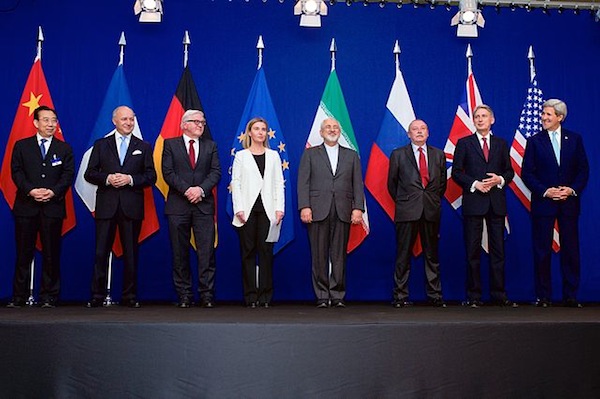
During his successful 2013 election campaign, the centrist President Hassan Rouhani pledged ‘to reconcile Iran with the world’, thus indicating that he (and others) felt a degree of personal responsibility for the long 35 years of the country’s distancing from the rest of the world. The framework agreement reached in Lausanne between Iran’s negotiators and the five members of the UN Security Council plus Germany (and the EU as such) has a much wider scope than just the nuclear issue and the lifting of sanctions, at least potentially. Rouhani has presented the accord as the ‘first step’ towards a new, less hostile, relationship with the West, but what it will certainly prompt is a thorough re-balancing of the region’s alliances. There is still a long way to go before Tehran and the US –still a regional power– are reconciled, with even more distant prospects for Saudi Arabia, but this is a decisive step towards Iran’s normalisation, from a position of greater influence and the construction of a new reality in the region, that cannot ignore Russia’s role in forging the agreement.
The Iranian architect of the accord –to be finalised in June, although the process can still throw up some nasty surprises– is Rouhani himself, who needs it to have economic sanctions lifted, including those imposed by the UN, the EU and the US executive (other US sanctions depend on a reluctant Congress, not the White House), which are weighing heavily on a population that has been promised better living standards. Rouhani would not have achieved success had it not been for the full support of the true focus of political and religious power, Ayatollah Ali Khamenei, whose health has been the subject of much speculation but who has not hesitated to promote the accord despite the letter of 47 US Republican senators warning that a new President in the White House could very well make it worthless.
Both Khamenei and Rouhani know that Iranian conservatives will resist the deal, so the spiritual leader has shown little public interest in normalising relations with the US, which were suspended during the hostage crisis 34 years ago. But the pact, formally agreed to by seven countries, has been achieved through direct negotiations with an Administration in Washington that no longer seeks to change the regime in Tehran but to resolve the nuclear issue –an Iran with nuclear weapons could trigger a destabilising regional atom-bomb race– and the re-integration of a more cooperative Iran in a region undergoing such troubling developments.
Iran is already involved, although on its own, in the fight both on the ground and in the air against the Islamic State or Daesh. This is a priority for the US and has weighed heavily in the negotiations in Lausanne. Seeing commanders of Iran’s Revolutionary Guards, such as Qasen Soleiman, leading Shiite militias and Iraqi regular troops in attacks (with US air support) to reconquer Tikrit must have caused substantial alarm in Riyadh. The Saudi regime is as concerned with Iran’s return to the international scene as Benjamin Netanyahu is, and although Israel has less of a say on this issue it still has some direct influence on the US Congress. Will the US trade Saudi Arabia for Iran as its main ally in the area? Perhaps things are not that easy, but the US is now well aware that the Saudis have assisted in causing many of the problems in the area, whether it be al-Qaeda or Daesh, that have ultimately turned against their own interests.
An understanding between Tehran and Riyadh should be fostered (but who by?) to contain the secular, religious and geopolitical confrontations between Sunni and Shia that were aggravated by the 1979 Khomeini revolution. Nevertheless, the prospects s very difficult. Many of us agree with Richard Haas that the current conflicts in the Middle East will last for decades, a modern-day version of the Thirty Years’ War. The Sunni-Shia confrontation is partly behind the civil war in Syria, although President Assad, who is now resisting with Tehran’s backing, has again become the lesser evil for the US. The same can be said about Yemen’s Houthis, allies of Iran, although the latter now share with the Saudis their animosity against al-Qaeda and the Muslim Brotherhood. Saudi Arabia, which has a long border with Yemen, and its allies in the Gulf –no less than a coalition of 10 States plus external support from Turkey– have engaged in attacks against the Houthi rebels, while a joint military force has been created by the Arab League to combat Daesh (without Iraq, which is Arab but mainly Shiite). Meanwhile, the US has exercised significant restraint and, while helping the Saudis, has made its priority keeping the Straits of Bab el Mandeb and Hormuz open to commercial traffic.
Saudi Arabia is seeing how Iran has steadily gained power and influence in recent years in areas that were previously controlled by Sunni minorities, especially in Iraq after Saddam Hussein was toppled by the US. The Saudis describe Iraq as ‘a country occupied by Iran’, but this is definitely not the case. Meanwhile, there is also Hezbollah in Lebanon. Some Arab regimes in the area feared what Jordan’s King described in 2004 as the emergence of a ‘Shia crescent’ in the region. But in view of the change of course in the US stance towards Iran they are starting to re-consider their rabidly anti-Iranian position. Although the US will have to exercise a large degree of brinkmanship between Tehran and Riyadh, a realignment is taking place in the region and the agreement reached in Lausanne, if finalised in June, should make a decisive contribution to it. Certainly, a new reality is emerging.


